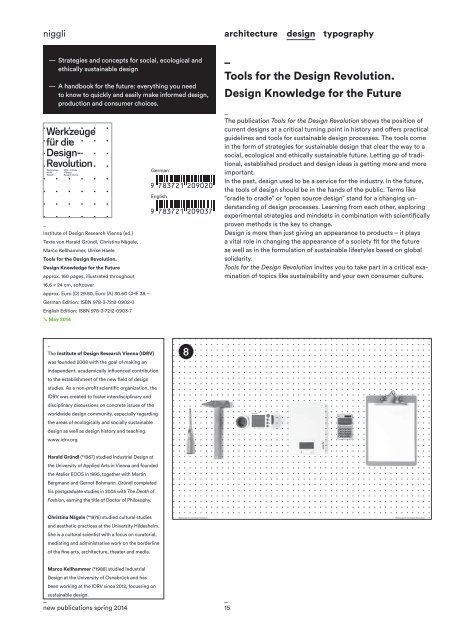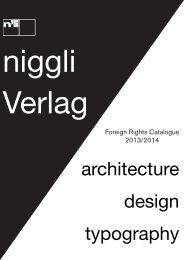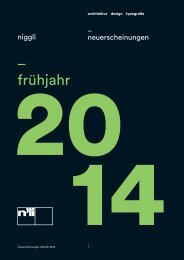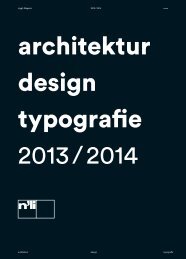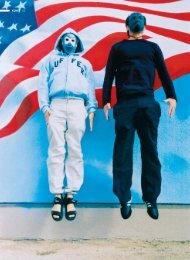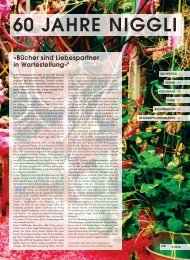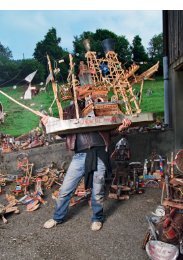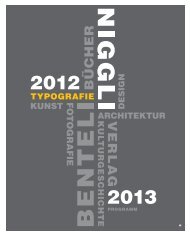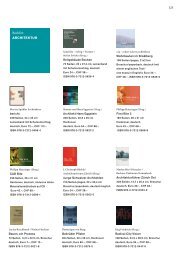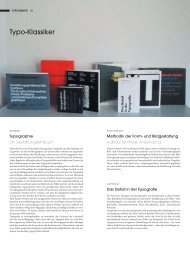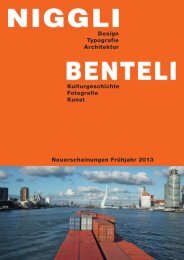_ spring - Niggli Verlag
_ spring - Niggli Verlag
_ spring - Niggli Verlag
Create successful ePaper yourself
Turn your PDF publications into a flip-book with our unique Google optimized e-Paper software.
niggli<br />
— Strategies and concepts for social, ecological and<br />
ethically sustainable design<br />
— A handbook for the future: everything you need<br />
to know to quickly and easily make informed design,<br />
production and consumer choices.<br />
Werkzeuge<br />
für die<br />
Design-<br />
Revolution<br />
Designwissen<br />
für die<br />
Zukunft<br />
IDRV – Institute<br />
of Design<br />
Research Vienna<br />
_<br />
Institute of Design Research Vienna (ed.)<br />
Texte von Harald Gründl, Christina Nägele,<br />
Marco Kellhammer, Ulrike Haele<br />
Tools for the Design Revolution.<br />
Design Knowledge for the Future<br />
approx. 160 pages, illustrated throughout<br />
16,6 × 24 cm, softcover<br />
approx. Euro (D) 29.80, Euro (A) 30.60 CHF 38.–<br />
German Edition: ISBN 978-3-7212-0902-0<br />
English Edition: ISBN 978-3-7212-0903-7<br />
↘ May 2014<br />
German<br />
English<br />
architecture design typography<br />
_<br />
Tools for the Design Revolution.<br />
Design Knowledge for the Future<br />
_<br />
The publication Tools for the Design Revolution shows the position of<br />
current designs at a critical turning point in history and offers practical<br />
guidelines and tools for sustainable design processes. The tools come<br />
in the form of strategies for sustainable design that clear the way to a<br />
social, ecological and ethically sustainable future. Letting go of traditional,<br />
established product and design ideas is getting more and more<br />
important.<br />
In the past, design used to be a service for the industry. In the future,<br />
the tools of design should be in the hands of the public. Terms like<br />
“cradle to cradle” or “open source design” stand for a changing understanding<br />
of design processes. Learning from each other, exploring<br />
experimental strategies and mindsets in combination with scientifically<br />
proven methods is the key to change.<br />
Design is more than just giving an appearance to products – it plays<br />
a vital role in changing the appearance of a society fit for the future<br />
as well as in the formulation of sustainable lifestyles based on global<br />
solidarity.<br />
Tools for the Design Revolution invites you to take part in a critical examination<br />
of topics like sustainability and your own consumer culture.<br />
_<br />
The Institute of Design Research Vienna (IDRV)<br />
was founded 2008 with the goal of making an<br />
independent, academically influenced contribution<br />
to the establishment of the new field of design<br />
studies. As a non-profit scientific organization, the<br />
IDRV was created to foster interdisciplinary and<br />
disciplinary discussions on concrete issues of the<br />
worldwide design community, especially regarding<br />
the areas of ecologically and socially sustainable<br />
design as well as design history and teaching.<br />
www.idrv.org<br />
8<br />
Harald Gründl (*1967) studied Industrial Design at<br />
the University of Applied Arts in Vienna and founded<br />
the Atelier EOOS in 1995, together with Martin<br />
Bergmann and Gernot Bohmann. Gründl completed<br />
his postgraduate studies in 2005 with The Death of<br />
Fashion, earning the title of Doctor of Philosophy.<br />
Christina Nägele (*1976) studied cultural studies<br />
and aesthetic practices at the University Hildesheim.<br />
She is a cultural scientist with a focus on curatorial,<br />
mediating and administrative work on the borderline<br />
of the fine arts, architecture, theater and media.<br />
8 Werkzeuge für die Design-Revolution Werkzeuge für die Design-Revolution 9<br />
Marco Kellhammer (*1988) studied Industrial<br />
Design at the University of Osnabrück and has<br />
been working at the IDRV since 2012, focussing on<br />
sustainable design.<br />
_<br />
new publications <strong>spring</strong> 2014<br />
_<br />
15


